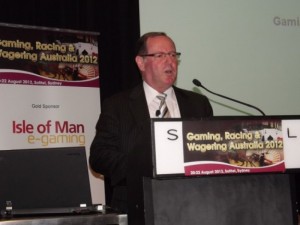Mandatory pre-commitment is unlikely to be put into effect in Australia for at least several more years because of the technological obstacles, which must first be overcome.


That was the conclusion of a specialist panel at the opening of the Gaming, Racing and Wagering Australia 2012 conference in Sydney today.
The gaming industry in Australia is facing a potentially ruinous threat from minority political elements in the Australian federal parliament seeking to curb the growth of gaming. While the current ruling coalition government does not support mandatory pre-commitment by players, it is being forced to at least pay lip service to experimenting with the notion.
Pre-commitment means that players planning to gamble in Australia’s casinos, clubs or pubs, should first commit to a maximum spend through a player’s card.
Although voluntary pre-commitment has been experimented with, but with only limited success, in Queensland, mandatory pre-commitment would have far greater implications if adopted.
There are now plans to begin a trial of MPC in the Australian Capital Territory (ACT), which is Canberra and its immediate environs. Reporting on the current situation with MPC to the conference were Ross Ferrer, CEO of the Gaming Technologies Association and Jeff House, CEO of Clubsact, the association representing the clubs industry in the ACT.
With two bills on the subject currently going through both houses of Parliament, Ferrer outlined the potential of each, emphasising both the MPC issue and the other main proposal which is to limit bets on slot machines to AU$1 (€0.84 or US$1.04) and a payout limit of $500. Both issues are concerned with ‘problem gamblers.’
“If you played a poker machine on these stakes and prizes for a year you will still spend $300,000, so I am not sure how that helps the problem gamblers,” he said. He also pointed out that in New South Wales the minimum stake was $10 but in Queensland and Victoria, the neighbouring states, it was $5 and in New Zealand’s pubs it was NZ$2, yet the available problem gambling research showed no difference between them. “Why?”, he asked.
The National Gaming Reform Bills, he said, did not take account of interactive gambling. Globally, online gambling revenues stand at US$30bn of which about US$1bn was from Australia. “This money is leaving Australia and that does not make sense.” He said: “For me, this is all about the convergence of gambling, just as we had the convergence of the table games and slot machines in electronic table games, but on a vastly more significant level.”
Both Ferrer and Jeff House agreed that some kind of trial of MPC needed to take place, although both felt that even if it led to full-scale adoption of MPC nationally, “problem” gambling would remain.
House said that the Australian Capital Territory had “taken the bullet for the rest of the industry,” when its clubs agreed to be used for the pre-commitment trial. ACT has about 5,000 of the country’s 200,000 slot machines or “pokies.” And the federal government had given a commitment to fund the trial and that the clubs would not be out of pocket because of it.
However, both House and Ferrer offered strong obstacles to even the trial taking place. It was not, as some politicians had suggested, a question of “flicking a switch.” Unlike the other states, ACT did not have an on-line reporting system in place, so technologically all of the machines would have to be converted to accept a network, or replaced.
That would take time… So would the composition of findings and the study of those findings, before a report could be made available to the federal government from which a firm policy one way or another on MPC or indeed, limiting stakes and prizes, would be made.
The original plan was for the trial to begin in February of 2012 with pre-registration by the clubs for the trial to come in November. Neither deadline looked likely, as a specification had yet to be issued by the federal government. The process of design, development, testing, approval and sales of new machines capable of accepting a network would take a year at least, but could be blown out to five years by obstacles on the way.
Ferrer: “My best guess for the start of a trial in ACT would be not before 2014.”
House: “The trial would run for 12 months, then after the preparation of the report, its submission and evaluation, it could be 2016 before any real conclusions could become apparent.”
Before then, a general election may have removed the issue altogether. Another hung parliament would be unlikely, at least to the degree where the balance of power is held by tiny minorities able to wield such power as now and the cost could be immense.
However, they both agreed that some form of voluntary pre-commitment, perhaps by 2016, was likely. “The industry supports this,” said House, “and the industry does need to respond or the focus will remain on us. We need to come up with something which deals with the public’s perception of problem gambling.”

